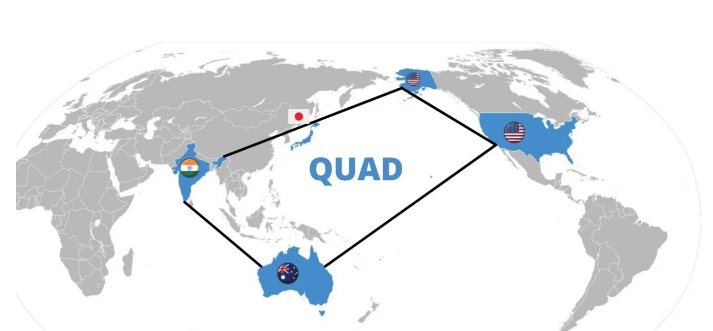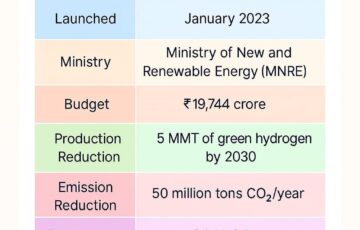Quad summit : stengthening indo-pacific security and global governance
Syllabus:
GS 2:
- India and its neighbourhood relation
- Bilateral , Regional and Global Grouping and Agreements involving India and/or affecting India
Focus:
The fourth Quad summit is set to take place in Wilmington, Delaware, on September 21, 2024. This high-level meeting is critical for strengthening Indo-Pacific cooperation amidst leadership transitions and ongoing global geopolitical challenges.
Immediate Context of the Quad Summit
- Leadership Transitions: U.S. President Biden and Japan’s PM Kishida face leadership transitions, stressing the urgency for the Quad to solidify its strategic commitments.
- Postponements: Previous postponements of Quad summits elevate the importance of this meeting, particularly given the pressing global challenges confronting member nations.
- India’s Role: Originally planned to host this year’s summit, India deferred to the U.S., aligning with practical considerations for President Biden’s busy election calendar.
- UNGA Link: The summit is being held alongside the United Nations General Assembly, highlighting its global significance in international diplomacy and security.
- Strategic Circle: This meeting brings the Quad full circle from its first in-person summit in 2021, symbolizing the evolution and growing importance of this partnership.
About Quad: Quadrilateral Security Dialogue
- Strategic Forum: The Quad is a security dialogue between the U.S., Japan, India, and Australia, aimed at promoting regional security and economic cooperation.
- Indo-Pacific Focus: The four countries prioritize maintaining a free and open Indo-Pacific, promoting democracy, human rights, and the rule of law.
- Countering China: The Quad aims to counter China’s growing influence in the region without positioning itself as a military alliance.
- Collaborative Meetings: Regular meetings at ministerial and leaders’ levels address key issues like maritime security, infrastructure, and supply chain resilience.
- Inclusive Approach: While the Quad balances China’s influence, it remains open to other nations that share its values and strategic interests.
Indo-Pacific Integration and Maritime Domain Awareness:
- MDA Focus: One of the summit’s primary goals is to strengthen the Quad’s Maritime Domain Awareness (MDA) framework, addressing regional security and supply chain vulnerabilities.
- IPMDA Expansion: The Indo-Pacific Partnership for Maritime Domain Awareness now includes the Indian Ocean region, integrating it into the broader Indo-Pacific strategic vision.
- UNCLOS Foundation: UNCLOS remains a cornerstone for promoting freedom of navigation, reinforcing international maritime norms within the Indo-Pacific region.
- Quad Legal Dialogue: Discussions may further launch the Quad Maritime Legal Dialogue, consolidating expertise in international maritime law to serve Quad nations and beyond.
- IFC-IOR Role: India’s Information Fusion Centre-Indian Ocean Region (IFC-IOR) will play a key role in facilitating real-time information sharing, reinforcing regional maritime security.
Tracking Progress and Emerging Opportunities:
- Key Initiatives: Leaders will assess progress on several initiatives, including Open-RAN in Palau, space-based climate systems in Mauritius, and off-grid solar projects in the Indo-Pacific.
- STEM Cohort: The first Quad science, technology, engineering, and mathematics (STEM) cohort’s outcomes will be reviewed, highlighting the Quad’s focus on technology and education.
- Regional Security: The Quad’s evolving role in Indo-Pacific security is underscored by rising threats from hostile actors and geopolitical conflicts in West Asia and Ukraine.
- China’s Influence: China’s assertive actions outside international norms heighten the need for a unified Quad response, stressing the importance of rules-based order.
- Supply Chains: Shifts in global supply chains away from China present opportunities for economic growth, resilience, and de-risking strategies for regional development.
The Outlook for the Quad and Global Governance:
- Summit of the Future: The Quad summit serves as a prelude to the UN’s Summit of the Future, aiming to reshape global governance through sustainable development and technological innovation.
- Global Aspirations: The Quad aligns with broader global aspirations, focusing on international cooperation, peace, and security, making it a regional microcosm of global governance efforts.
- Future Initiatives: As the Quad matures, this summit could lay the groundwork for future initiatives, aligning with global benchmarks in sustainable development and security.
- Sustainable Governance: By addressing critical issues such as climate change, technology, and economic resilience, the Quad seeks to champion governance models for the Indo-Pacific and beyond.
- Pivotal Moment: The Wilmington summit could be a defining moment for the Quad, assessing its progress and reinforcing its role in shaping regional and global futures.
Challenges:
- Leadership Transitions: Impending changes in leadership for key Quad members (U.S. and Japan) may disrupt continuity and long-term strategic commitments within the partnership.
- Security Concerns: China’s assertive actions and regional security threats require a coordinated response, but member-nations face different priorities and resource limitations.
- Implementation Delays: Delays in key projects like Open-RAN and maritime domain initiatives hinder the Quad’s ability to achieve its regional security and infrastructure goals.
- Economic Resilience: The Quad faces challenges in reducing dependence on China in global supply chains while ensuring economic resilience for member countries.
- Strategic Alignment: Balancing the diverse geopolitical interests of member-nations makes it difficult to maintain cohesive and consistent policy directions on regional issues.
Way Forward:
- Leadership Stability: Clear and consistent communication among Quad members can mitigate the effects of leadership transitions, ensuring continuity in strategic decision-making.
- Strengthening Alliances: Reinforcing partnerships within the Indo-Pacific and increasing engagement with like-minded nations will enhance regional security and resilience.
- Project Acceleration: Fast-tracking implementation of key projects, such as MDA frameworks and infrastructure initiatives, can strengthen regional cooperation and impact.
- Supply Chain Diversification: Building diversified, resilient supply chains that are less dependent on China can increase economic stability and reduce risks in the Indo-Pacific region.
- Unified Strategic Vision: Maintaining a unified vision that aligns the Quad’s long-term goals with the geopolitical interests of each member is essential for sustained success.
Conclusion:
The Wilmington summit represents a pivotal moment for the Quad to assess progress, tackle emerging global threats, and reaffirm its commitment to regional security and economic cooperation. A unified, proactive approach is necessary to address shared challenges effectively.
Source: Indian Express
Mains Practice Question:
The Quad is evolving as a strategic framework for ensuring stability in the Indo-Pacific region. Analyze the key challenges it faces and suggest measures to strengthen its regional and global impact.
Associated Article:
https://universalinstitutions.com/pm-to-attend-quad-summit-address-indian-diaspora-in-us/





